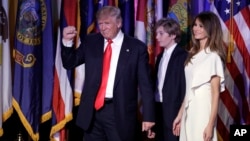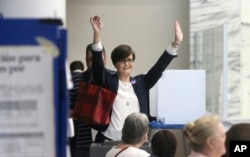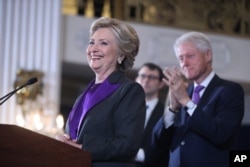Many elections experts are trying to decipher Donald Trump's surprising presidential victory that defied most poll projections as he chalked up wins in states that have favored Democrats in past elections.
"He did extremely well in small towns and rural areas,” Emory University political expert Alan Abramowitz told VOA, “and just generally was able to capitalize on this anger and frustration out there among a pretty large segment of the electorate, mainly white voters without a college degree, who felt they've been ignored and perhaps also who resent that they see immigrants and minorities taking their jobs or getting advantages they don't get.”
Trump's strong performance in rural America was enough to offset the heavy turnout among urban voters who cast ballots for Democratic presidential candidate Hillary Clinton.
And although Abramowitz remains skeptical, he said preliminary data suggest Trump fared relatively well among minorities.
"According to the exit polls, he actually did a little bit better with African-Americans and even Latinos than Mitt Romney did four years ago," he said.
Abramowitz said the polls in key swing states the Republican presidential candidate won — such as Wisconsin, Pennsylvania and Michigan — were particularly inaccurate, while polls in Florida were "pretty close."
The American Association for Public Opinion Research, which represents polling professionals, is at a loss over how most polls miscalculated the election results.
"It looks like a fairly serious miss on the part of the industry and nobody's really sure yet what happened," said association President Roger Tourangeau in an interview with VOA.
Most pollsters underestimated the nationwide vote, and in the swing states of Wisconsin, Michigan, Florida, Pennsylvania and Ohio by 2 to 4 percentage points, according to Pennsylvania State University polling expert Eric Plutzer. He said those polling results appear to be outside the traditional bounds of margin of error.
"The error is magnified by the fact that Trump won the Electoral College by a comfortable margin, even though he has apparently lost the popular vote,” Plutzer told VOA.
The American Association for Public Opinion Research said it will study the election results and issue an official report on its findings early next year.
Association president Tourangeau told VOA it will determine whether there are systemic biases in who is selected to participate in surveys, confirm suspected systemic differences in the modes used to conduct polls (i.e., live telephone interviews, automated phone calls or online panels), and find out whether voters were underreporting their support for Trump.
"A lot of people have been speculating about shy Trump supporters, claiming they vote for Clinton but were in fact voting for Trump," Tourangeau said.
Whatever the conclusions are in the association's upcoming report, Plutzer said future demand for polling is expected to remain as strong as ever.
"The public's insatiable demand for polls, there were over 1,000 national horse-race polls in this election, is unlikely to disappear," he said.
But Plutzer added the polling industry will be forced to develop innovative polls that try to understand how ordinary voters think rather than just trying to determine where candidates stand in their efforts to win elections.






